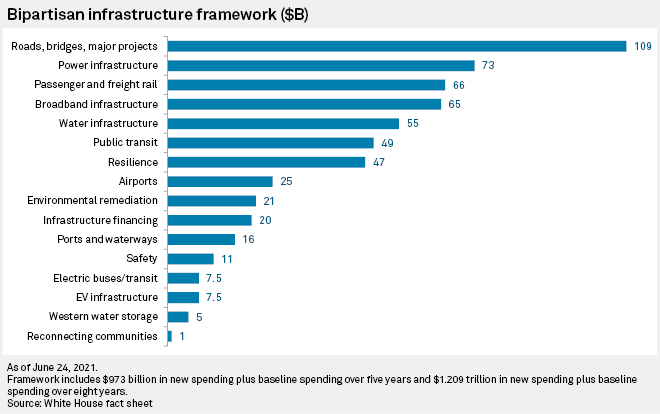S&P Global Offerings
Featured Topics
Featured Products
Events
S&P Global Offerings
Featured Topics
Featured Products
Events
S&P Global Offerings
Featured Topics
Featured Products
Events
Banking & Capital Markets
Economy & Finance
Energy Transition & Sustainability
Technology & Innovation
Podcasts & Newsletters
Banking & Capital Markets
Economy & Finance
Energy Transition & Sustainability
Technology & Innovation
Podcasts & Newsletters
S&P Global Offerings
Featured Topics
Featured Products
Events
24 Jun, 2021
By Ellie Potter and Zack Hale
President Joe Biden and a bipartisan group of 10 U.S. senators reached an agreement on an infrastructure package that includes tens of billions in energy infrastructure funding.
The $579 billion Bipartisan Infrastructure Framework would provide $73 billion to spur power infrastructure development and $21 billion for "environmental remediation," according to a June 24 White House fact sheet. The package would provide $7.5 billion for electric vehicle infrastructure and $7.5 billion for electric buses and transit.
The framework would fulfill the president's goal of seeing 500,000 electric vehicle chargers installed, which, according to the fact sheet, would be the largest investment in electric vehicle infrastructure in history. It would also upgrade the power grid by supporting the construction of thousands of miles of transmission lines to support renewable energy sources and would help finance the cleanup of legacy pollutants, especially those in disproportionately affected low-income and minority communities.

To help pay for those investments, the White House listed a "strategic petroleum reserve sale" as one of 13 proposed financing sources.
After months of negotiations between the White House and Congress, Biden noted that neither side got everything it wanted in the deal but said the framework "represents an important step forward for our country." It includes two-thirds of the investments Biden originally proposed in the energy and climate realms, he added.
"Today is a huge day for one-half of my economic agenda, the American Jobs Plan," Biden said during a June 24 press conference. "It delivers clean transportation ... clean water, universal broadband, clean power infrastructure and environmental resilience."
In addition to potential opposition in Congress, the fate of the bipartisan deal rests largely on the passage of a separate bill that includes various provisions Biden included in the American Families Plan, which he wants to be addressed during the fiscal year 2022 budget process. The president pledged not to sign the infrastructure deal into law without provisions of the families package delivered to his desk in tandem.
Fate of separate bills still unclear
Notably, the president did not mention the inclusion of a clean energy standard, which was in his jobs plan. But U.S. Reps. David McKinley, R-W.Va., and Kurt Schrader, D-Ore., on June 24 reintroduced a bipartisan bill to establish a national clean energy standard that would require the U.S. to cut its greenhouse gas footprint by 80% by 2050. How that legislation, which is opposed by major environmental groups, might fit into broader infrastructure negotiations is still unclear.
Earlier in the day, the Senate Energy and Natural Resources Committee also discussed the Energy Infrastructure Act, a draft bill the committee released last week. Whether any pieces of that bill will be included as part of the negotiated framework is also uncertain.
Committee Chairman Joe Manchin, D-W.Va., a critical swing vote in the evenly divided Senate, said it was crucial that Congress invest in infrastructure "in ways that are both fiscally responsible and reflect the needs of our nation." The right infrastructure strategy could strengthen the economy, create jobs and help combat climate change, Manchin said during a June 24 hearing.
"Although I don't anticipate we will all agree on the size or scope of investment necessary to do this, I think all of my colleagues will agree that the areas within our jurisdiction are an important piece of the broader conversation about our infrastructure needs," the chairman said. "This almost-$95 billion investment would deliver on the president's American Jobs Plan in many big ways that can garner bipartisan support."
Manchin also pledged to work with colleagues on a bill to extend the Abandoned Mine Land reclamation fee, which supports mine cleanup efforts, before that fee expires in September. While the bill includes some funding for reclamation work, additional resources are needed, Manchin said.
While thanking the chairman for his work to draft a bipartisan infrastructure bill, committee ranking member John Barrasso, R-Wyo., noted that he did not have the chance to review or provide input on the bill before its release. The bill still needs work, according to the Republican, who called for building "broad consensus" on the proposal.
In addition to other grievances, Barrasso was concerned that the bill "includes almost no permitting reform."
"Permitting reform is one thing that we really need to actually get infrastructure built," the ranking member said.
Federal agency officials told the committee that the draft bill was a starting point to help implement Biden's proposed 10-year, $2 trillion American Jobs Plan.
"This discussion draft of the committee will help us do more," said Kathleen Hogan, the U.S. Energy Department's acting undersecretary for science and energy. "But today's challenge will not be met without the scale and scope of the American Jobs Plan."
